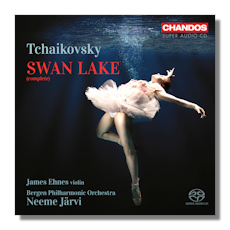
The Internet's Premier Classical Music Source
Related Links
- Tchaikovsky Reviews
- Latest Reviews
- More Reviews
-
By Composer
-
Collections
DVD & Blu-ray
Books
Concert Reviews
Articles/Interviews
Software
Audio
Search Amazon
Recommended Links
Site News
 SACD Review
SACD Review
Piotr Ilyitch Tchaikovsky

Swan Lake, Op. 20
- Complete Ballet
James Ehnes, violin
Bergen Philharmonic Orchestra/Neeme Järvi
Chandos SACD CHSA5124(2) 81:17 & 73:24
Once upon a time, ballet music used to be the territory of specialists. Musicians groomed in the theatre or with a special flair for drama gave ample proof that ballet scores didn't have to remain limited to stage performances. Conductors like Ernest Ansermet, Pierre Monteux, Anatole Fistoulari, Antal Doráti, Evgeny Svetlanov, Gennady Rozhdestvensky, among others, brought elegant and vivid accounts of the great ballet scores by Tchaikovsky, Delibes, Prokofiev and Stravinsky which have stood the test of time. The appeal of these recordings didn't stem from this often supposed suitability as dance accompaniment. Rather it was a profound understanding of the mechanics of these particular scores, reviving the particular spirit of each ballet on disc just like any seasoned opera conductor naturally would do, which secured them a place among the great orchestral works. Nowadays, however, when several ballet scores have been widely accepted as "serious" music, everybody seems ready to take a swing at them. And the results are variable.
This new recording of Tchaikovsky's first ballet Swan Lake by the Bergen Philharmonic Orchestra under Neeme Järvi is a disappointingly uneven affair. For one thing it doesn't evoke much sense of the theatre, but rather of the cold studio. Järvi performs the complete ballet, including the pieces Tchaikovsky added soon after the premiere (the extra Pas de deux #19a in the 3rd Act as well as the Danse russe #20a), conveniently split between Acts 2 and 3 on two discs. Yet what seems to be lacking in this traversal is a true direction. At the end of the 2 hours 30 of music you still wonder where Järvi wanted to go. In some instances he secures agreeably nuanced playing (as in both the major Waltzes #2 and #17), yet on other occasions he just seems to be floating around like the corpse of the drowned ballerina gracing the telltale cover of this release, if he doesn't jump the orchestra with unwarranted breakneck tempi (#4-VI, 5-IV, 8, 23). As the similarly uninspired recording of the ballet by Mikhail Pletnev and the Russian National Orchestra there is no attempt at telling the story – forget Swan Lake also has its moments of joy, tenderness, and magic. Numbers succeed each other rigidly without much fantasy or sense of structure, eventually diminishing Tchaikovsky's accomplishment and reducing his ballet to the sequence of interchangeable dance tunes churned out by most of his contemporaries. The Pas de deux's don't breathe as living organisms but are merely unrelated short pieces performed in different tempi. The Dances of the Swans in Act 2 – the core of the ballet – suffer most. Järvi finds little elegance in these pages (Odette's solo is weirdly phrased, reminding me of that drunk trying to prove he can still walk a tightrope) and overall there is few dramatic cohesion. It doesn't help either that these discs were recorded on at least two separate occasions (June and December 2012).
There are some excellent soloist contributions, foremost from Canadian guest violinist James Ehnes animating the grand adagios (#5-II and 13-V), but also the fine harp from Johannes Wik and the cornet from Gary Peterson (in the Neapolitan dance) stand out from the more routine woodwinds.
There are also some oddities in the version performed here. The harp cadenza introducing the famous Pas d'action (Odette et le Prince) in the 2nd Act is not the original but the one usually heard in the stage version of St. Petersburg's Mariinsky Theatre. In the final scene some 24 bars of the coda are repeated, which makes little sense on disc as it was included to give stagehands in the theater extra time to change the scenery.
Curiously, the Chandos publicity is making a lot of the fact that we have here the complete, uncut score of Swan Lake as Tchaikovsky composed it, as if it would be a premiere on disc – Antal Doráti already recorded the complete ballet in 1954 with the Minneapolis Symphony Orchestra, followed by countless others. Audiophiles will note this release is available as a DSD/SACD recording, offering punchy dynamics but also rather dry and distant sonics. On the plus side, the booklet contains fine liner notes from David Nice introducing Tchaikovsky's ballet and providing a synopsis and details of the individual numbers. To fathom the lake, however, one needs to look elsewhere.
Copyright © 2014, Marc Haegeman




















